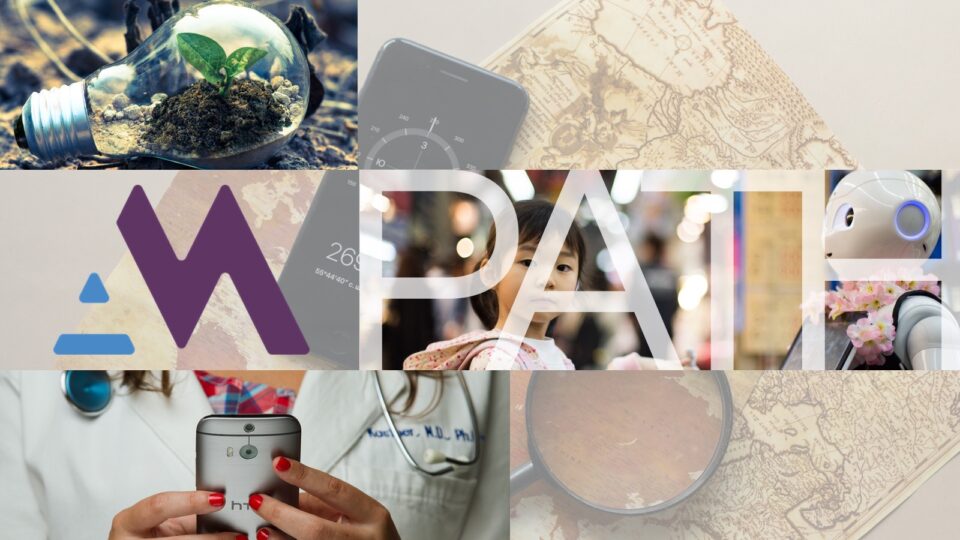
Amber Mac’s (Mostly) Business Survival Guide 2023
by Amber Mac on January 9, 2023
Below you will find my 2023 framework to guide our business at AmberMac Media, including the clients we pitch, the content we create, and the keynotes I present. It’s called The P.A.T.H., a 4-pillar (mostly) business survival guide for the future.
P: Purposeful Persuasion
The next generation is persuading us to make better choices. While we’ve talked for many years about building businesses (and our lives) with purpose at the core, Gen Z is on a mission to get us there thanks to many online tools and apps that help them voice their concerns.
However, they need our help. When we look at the challenges of today. the next generation can draw attention to these issues but they do not yet hold the power to fix them.
Let’s focus on one of the most critical concerns: the warming climate. There is much talk today about this crisis, but not enough dialogue about this opportunity. Thanks in large part to climate tech, we have a window of time right now to transform how we live, work, and play in a more sustainable way.
The climate crisis is also suffering from a communication crisis. Here’s a good read on how we can all simply change the words we use to be more persuasive about embracing climate opportunities: “By moving the language of business away from competition toward collaboration, we create a new definition of success, qualified by values that go well beyond the bottom line.”
When we learn how to embrace purpose and persuade others to support these causes, we can design a better future.
Book to Read: The Persuaders: At the Front Lines of the Fight for Hearts, Minds, and Democracy
Article to Read: Six Climate Breakthroughs
A: AI Adoption
We have been writing for more than 5,000 years. In 2023, this communication method is moving beyond humans. You’ve probably heard about ChatGPT, but like so much of today’s disruptive technology, few people explain its impact in a way that the average person can understand.
ChatGPT is an artificial intelligence (AI) chatbot that can simulate human conversation. Most often, we see and use chatbots for online customer service. Most often, they do not work well.
However, the quality of these conversations is improving dramatically thanks to tools such as ChatGPT. Along with this improvement, we must ask ourselves a steady stream of questions about what happens when AI-generated writing lands in our laps.
Schools are already dealing with these challenges, including AI-assisted plagiarism. During a recent keynote speech, I demonstrated how to use one of these tools called Jasper to write social media copy about the event I was attending. There were audible gasps in the room when Jasper generated a paragraph of text about the event with just a few keyword prompts – a paragraph that sounded engaging and, yes, human.
On this topic of text generation, my prediction is that skills such as public speaking will (and should) become more important in the context of education and business. In short, learning how to be a persuasive public speaker in 2023 is a smart investment of time.
While we worry about the “scary” evolution of ChatGPT, artificial intelligence is also helping to save and improve lives. For example, read how “AI technology has helped to triple patient recovery from strokes in England”. There are thousands of other encouraging stories about how AI is shaping the future of healthcare (more on this below).
As AI chips away (no pun intended) at what were once only human skills, verbal skills will carry more weight. On the topic of skills, let’s move on to the one human skill that is becoming more important than ever: building trust, the next pillar in our framework.
Tool to Try: Synthesia is a web-based platform for creating videos with AI avatars
Article to Read: Google Teases AI Tool That Can Decipher Your Doctor’s Messy Handwriting
T: Trust Building
What are the three elements of trust? Harvard Business Review defines these as Positive Relationships, Good Judgment/Expertise, and Consistency. Alongside learning how to be a Purposeful Persuader and an AI Adopter, the world desperately needs Trust Builders.
As the Atlantic Council describes in a 2023 Strategy Paper, there is a growing trust deficit that is destabilizing democracies and that can “introduce volatility that the world can ill afford”. Technology exacerbates these issues with algorithms of hate, dividing societies through not just anger but, as the author of The Persuaders describes, disgust.
I believe that rebuilding trust is possible. Beyond the issues with Big Tech, one of the cornerstones of distrust right now in our world is poor communication. Take a moment to analyze a leader you know, whether it’s a politician or your boss. There is a very good chance that they do not practice the three elements of trust outlined above.
In today’s digital economy, each one of us can nurture positive relationships, practice good judgment, and maintain consistency in our face-to-face relationships and our online relationships. This often means focusing on strengthening new habits and breaking bad habits. After all, just like maintaining a healthy food diet requires discipline, building trust requires discipline, too. If you’re at the point in your life or in your work that bad habits are affecting these elements of trust, read more about why science says that perseverance and planning are the underpins of successful change.
Article to Read: How to Make Time for What Matters
Article to Read: In The Era Of ‘No-Normal:’ Trust, Tech And Circularity
H: Health Tracking
There’s a good chance that your local healthcare system is in crisis, but your community is just one of many at risk. In fact, this is a worldwide problem. As KPMG reports, “By 2030, there will be a shortage of approximately 18 million health workers – one-fifth of the workforce needed to keep healthcare systems going”.
While there is no replacement for good healthcare workers, more of us will start to rely on health tracking tech to oversee everything from heart health to sleep habits and beyond. With virtual care thriving, more of us will also use live video to see a doctor. With mental health issues on the rise, more of us will subscribe to apps such as Calm and Woebot to prioritize our wellness.
Speaking of wellness, here’s what Shopify says about this flourishing industry. “Prioritization of health has supercharged growth in the industry – growth that looks set to continue in the future. In 2022, the global wellness market is projected to hit $5.59 trillion. By 2025, it’s expected to reach nearly $7 trillion – a 25% increase.”
As I mentioned in my intro, there is a growing divide between the people who know how to leverage tech to succeed and the people who will get left behind. In the health tracking tech space, this divide is even more worrisome since access to these innovative tools in the midst of a global healthcare crisis can mean the difference between life and death.
A few countries, such as Germany, are working to shrink this divide. For example, as of 2019, German doctors can prescribe health apps to their patients to help with a wide range of medical conditions. If you have the opportunity, we can all put pressure on our elected leaders to make sure health tech equity is a priority in our communities and beyond. You should also try to learn how health tracking tech can improve your life. After all, without our health and wellness intact, none of the above is possible.
Article to Read: Smart Tech to Diagnose You at Home
Article to Read: Modern Life & Our Powers of Concentration
In conclusion, the P.A.T.H. forward in 2023 requires a focus on the following: Purposeful Persuasion, AI Adoption, Trust Building, and Health Tracking. Each of us has the ability in our own spaces to use this blueprint in our businesses and in our personal lives, to move within our communities and industries from competition to collaboration. After all, predictable unpredictability is still the state of play in 2023, but with a plan in place, you’ll be able to start to take some of those bigger (and necessary) steps forward. –@AmberMac




